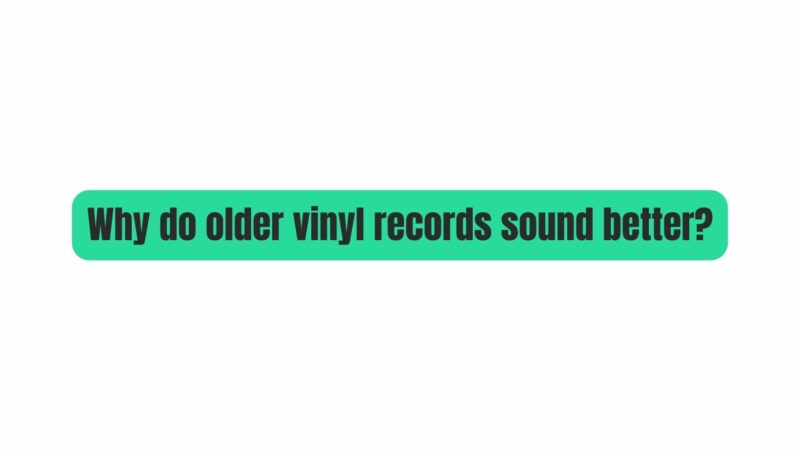In the ever-evolving world of audio technology, older vinyl records continue to captivate audiophiles and music enthusiasts with their timeless allure. Many seasoned listeners argue that there’s something magical about the sound of vintage vinyl, a warmth and authenticity that seems to elude modern recordings. But what is it that makes older vinyl records sound better to so many ears? In this comprehensive exploration, we will delve into the factors contributing to the sonic charm of vintage vinyl, including the analog recording process, vinyl material quality, mastering techniques, and the nostalgia factor.
I. The Analog Warmth
1. The Analog vs. Digital Divide: Older vinyl records belong to the analog era, where sound is recorded and reproduced in continuous waveforms. Modern digital recordings, on the other hand, sample sound into discrete values. 2. Sonic Continuity: Analog recordings capture sound in a continuous, organic manner, which some listeners find more faithful to the natural world of sound. 3. Warmth and Naturalness: The analog warmth often associated with vintage vinyl is attributed to this continuous representation, offering a natural, pleasing, and unprocessed sound.
II. Vinyl Material Quality
1. Vinyl Composition: Older vinyl records were often pressed using high-quality vinyl compounds, contributing to their durability and sound quality. 2. Weightier Vinyl: Many vintage vinyl records are noticeably heavier, providing increased stability and reduced vibrations during playback. 3. Quieter Surface Noise: The better-quality vinyl used in older records tends to produce less surface noise and fewer pops and crackles, contributing to a cleaner listening experience.
III. Mastering Techniques
1. Analog Mastering: Vintage vinyl records were typically mastered using analog techniques. The analog mastering process is known for its subtlety and preservation of dynamics. 2. Less Compression: Older records often feature less compression, allowing for a wider dynamic range and a more nuanced representation of the music. 3. Vintage Equipment: The mastering equipment used in the past, including tube-based amplifiers and analog equalizers, is believed by some to impart a unique character to the sound.
IV. Nostalgia and Perception
1. Nostalgia Factor: The nostalgia factor plays a significant role in the perceived superiority of older vinyl records. They are often associated with cherished memories and a sense of the past. 2. Listener’s Perception: Our perception of sound is influenced by our emotional connection to music. The positive emotions associated with older vinyl can enhance the perception of their sound quality. 3. Subjective Experience: The belief that older records sound better can be a self-fulfilling prophecy, as the listener’s expectation of a superior experience can impact their enjoyment.
V. The Vinyl Revival
1. Resurgence of Vinyl: The resurgence of vinyl records in recent years has led to the availability of high-quality vinyl pressings that aim to recreate the vintage sound. 2. Audiophile Pressings: Audiophile-quality reissues are often meticulously produced to replicate the warmth and authenticity of older vinyl records. 3. Vinyl Record Labels: Some record labels specialize in reissuing classic albums using analog mastering and high-quality vinyl, catering to audiophiles seeking the vintage sound.
VI. Real-World Listening Experiences
To truly understand the appeal of older vinyl records, it’s essential to consider the real-world listening experiences of those who have embraced vintage vinyl.
1. Listener Testimonials: Many audiophiles and music enthusiasts attest to the unique and captivating sound of older vinyl records. 2. Analog Enthusiasts: Audiophiles who appreciate the analog sound often prefer vintage vinyl for its warmth, dynamic range, and sonic authenticity. 3. Comparative Listening: A/B comparisons between older vinyl and digital formats sometimes reveal subtle, yet appreciable, differences in sound quality.
VII. Conclusion
In conclusion, the belief that older vinyl records sound better is rooted in a combination of factors, including the analog warmth of the medium, the quality of vinyl material used, analog mastering techniques, and the nostalgia and perception of the listener. While the analog nature of vintage vinyl contributes to its unique sound, the emotional connection listeners have with these records amplifies their perceived sonic superiority.
The vinyl revival has provided a bridge between the past and the present, allowing a new generation of music enthusiasts to experience the magic of vintage vinyl. Whether it’s the crackle of the needle dropping onto the groove or the unmistakable warmth of analog sound, older vinyl records continue to hold a special place in the hearts and collections of audiophiles and music lovers worldwide. Ultimately, the appeal of older vinyl records transcends objective sound quality, offering a timeless and immersive listening experience that resonates deeply with those who embrace its charm.


